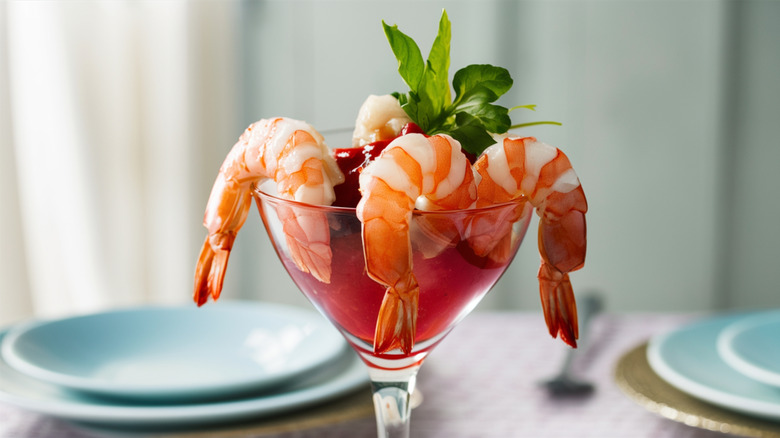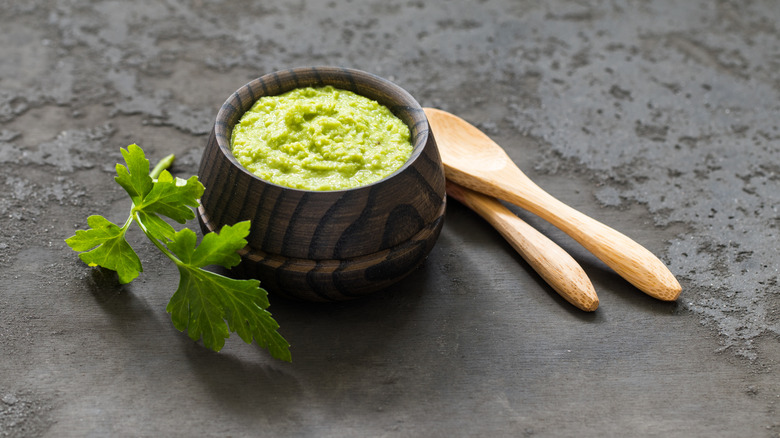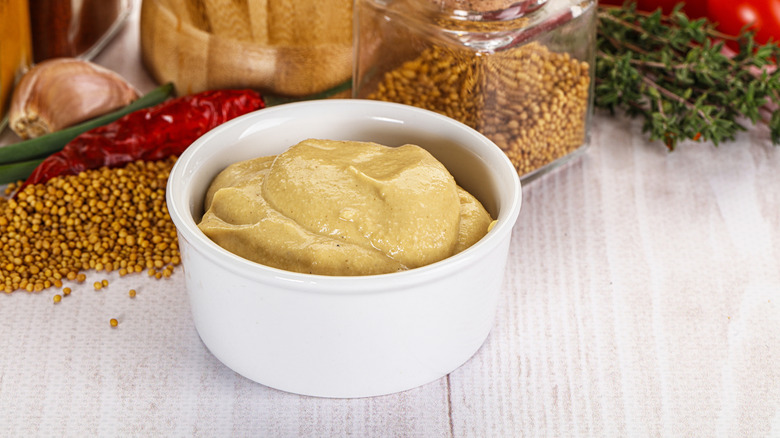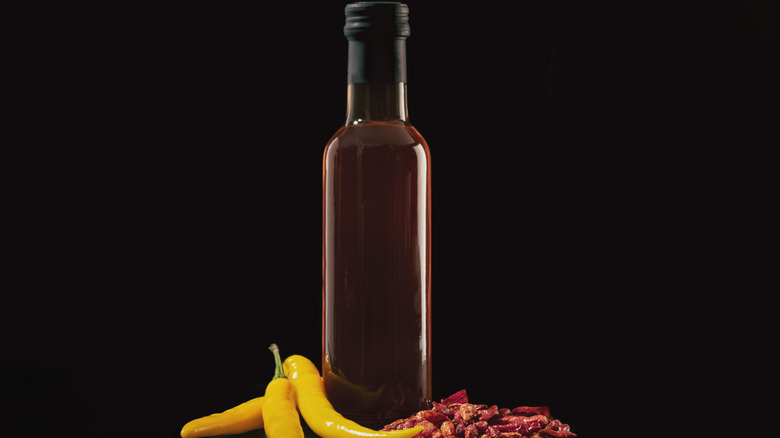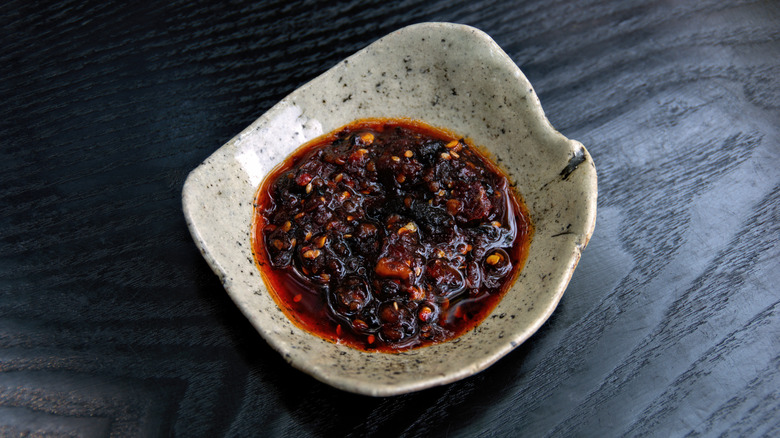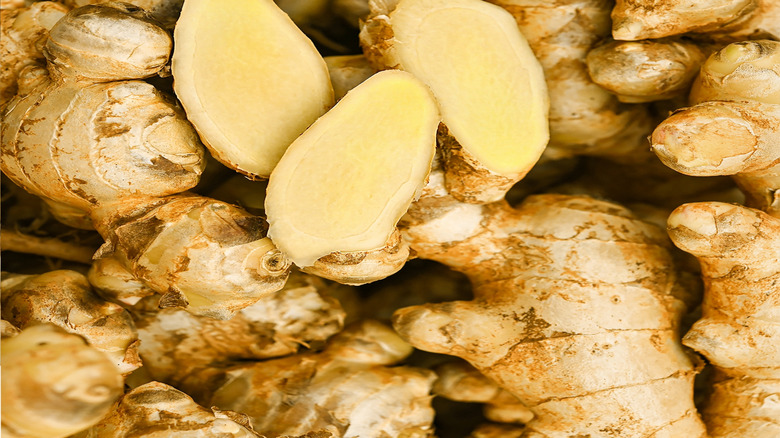5 Easy Substitutes For Horseradish In Cocktail Sauce
We may receive a commission on purchases made from links.
There's much to be said about a cocktail sauce with a bold level of heat. With applications for dishes including seafood and beyond, a spicy cocktail sauce can be used and reused in a number of creative ways. The spiciness in a classic cocktail sauce recipe typically comes from the pungent addition of prepared horseradish. If you like it really hot, mixing extra hot Atomic Horseradish (available on Amazon) into your cocktail sauce is the way to go. However, if you'd prefer to forego horseradish for an alternative source of intense flavor, there are plenty of options that will still bring the heat including chili paste, ginger root, hot sauce, wasabi, and hot mustard.
The thing you want to remember when making an ingredient substitution is that you're not just replacing the taste but also the texture. As such, be aware that using an ingredient of a different consistency will likely alter the overall mouthfeel of your cocktail sauce, meaning it could come out thicker or thinner than you're used to. Depending on how you intend to use your cocktail sauce, you'll want your choice of ingredient to add the right level of heat for a sauce that is both palatable and properly applicable to your dish. Also consider the overall cohesiveness of your flavor profile when preparing a cocktail sauce without horseradish.
Wasabi
Punching up your cocktail sauce by adding wasabi paste is definitely an easy win for a flavor that is similar to horseradish but brings a greater intensity. This sinus-clearing condiment is closely associated with Japanese cuisine as an accompaniment to sushi and sashimi. As such, you can be confident in using a wasabi paste, such as Wasabi-O premium wasabi paste, in your cocktail sauce, knowing that it will pair well with seafood dishes, such as crab and shrimp cocktail lettuce wraps and more. Of everything you need to know about wasabi, one important note is that imitation versions of wasabi often use horseradish paste combined with green food coloring, which goes to show how easily the two can be swapped in for one another, especially in the context of a cocktail sauce.
When replacing horseradish with wasabi in your cocktail sauce, a ratio of ½ teaspoon wasabi paste to one teaspoon of horseradish should align neatly. Of course, if you want more intensity, feel free to adjust to your liking. Knowing that imitation wasabi paste is so prevalent, it's also worth double-checking your store-bought brand to ensure you're getting not only the right flavor but the right ingredients. If you have an Asian market local to you, this would be the best place to look for both genuine wasabi and imitation wasabi paste.
Hot mustard
Albeit thinner than prepared horseradish, hot mustard packs a similar punch that makes a great replacement for a cocktail sauce that isn't meant to be overly thick and hearty. Knowing Chinese hot mustard gets its distinct spicy kick from the chemical reaction when its brown mustard seeds are crushed and mixed with water, rest assured that this ingredient swap will pack a much-desired punch for your cocktail sauce. This cocktail sauce upgrade is perfect for something other than dipping your shrimp — it's practically made for the ultimate Bloody Mary.
Keeping in mind that this will produce a cocktail sauce that is on the thin side, a 1:1 ratio of hot mustard (such as Dynasty Chinese-style mustard) to horseradish will nonetheless maintain the desired level of intensity. Of course, you can easily make adjustments to taste if you want your sauce even hotter. If you use this swap for a quick three-ingredient shrimp cocktail sauce, it would go particularly well mixed into shredded crab meat or imitation crab for a refreshing seafood salad with an impressive level of spice. Although it isn't ideal for dipping, it's a fantastic spicy ingredient for mixing.
Hot sauce
Swapping in hot sauce for a cocktail sauce without horseradish might seem questionable; however, it can yield a unique mixture largely dictated by the hot sauce of your choosing. This is also a good idea if you want a milder cocktail sauce that has some spice without the intensity of a pungent prepared horseradish. When choosing from the best grocery store hot sauce brands, many of these will be heavy on vinegar and vary in Scoville level. You can also prepare your own hot sauce recipe to add to a cocktail sauce, which would allow you to moderate the spiciness to your preference.
If you were already planning to break out the cocktail sauce at your next barbecue to add zing to grilled meats, this presents the perfect opportunity to customize your cocktail sauce for the occasion. Choose a hot sauce like Franks RedHot original hot sauce that will complement your grilling proteins and temper the heat with the sweetness of the other ingredients in your mix. Taste as you go and be mindful of the variance in texture to get the ideal consistency for a marinade or finishing sauce.
Chili oil
Similar to elevating your cocktail sauce with chili paste, you can also incorporate chili oil for a dash of zingy spice in place of the standard horseradish. While this will certainly veer your cocktail sauce in a different direction, this makes your cocktail sauce ideal for applications that call for a thinner cocktail sauce and one that, like hot mustard, is best used for mixing. Because chili oil is the go-to pantry ingredient to give meat marinades a kick, it can be used in a cocktail sauce without horseradish similarly to one with hot sauce for a boost of flavor when grilling.
The versatility of chili oil aligns with that of cocktail sauce, meaning that combining the two covers most of the bases when it comes to veggies, meats, and more. While cocktail sauce is still typically thought of as synonymous with seafood, infusing different ingredients into it only helps to expand the boundaries of your culinary creativity. Starting with a chili oil from a brand like Lee Kum Kee, it's important to know that it will thin out the consistency of your cocktail sauce. Still, you can use a 1:1 ratio and try it outside the confines of a dipping condiment.
Ginger
A popular warming spice, ginger gives cocktail sauce a different yet still pungent kick of intensity than its prepared horseradish counterpart. Like horseradish, ginger is a root and can be made into a paste (such as Aroma One ginger puree paste) of a similar texture, meaning the overall consistency of your cocktail sauce won't be compromised. Among the different ways to use ginger paste, mixing it into a cocktail sauce will yield a delightful dipping condiment.
Although the taste is distinctly different from horseradish, ginger is optimal for those who want a cocktail sauce with a more manageable level of heat. Start with a 1:1 ratio for the replacement and adjust to your taste preference. Consider using this updated cocktail sauce for dipping fresh shrimp, battered fish sticks, and more. The subtle sweetness and spice creates a great, cohesive flavor profile for fried foods, seafood, and even a great glaze for meat dishes such as meatloaf.
